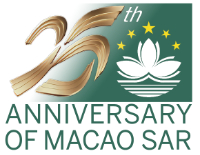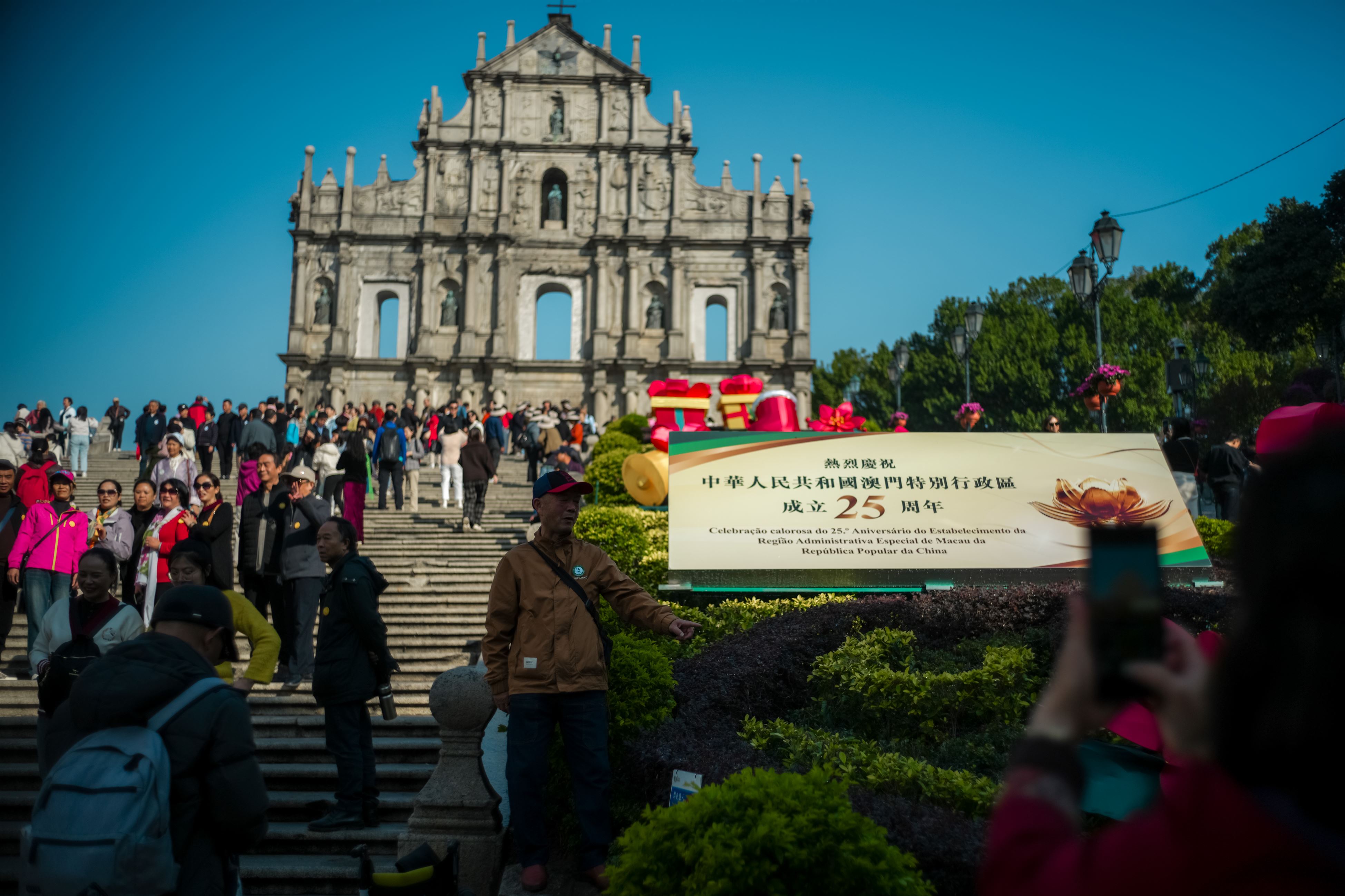Commitment to 'one country, two systems' principle driving region's development

When recalling the visit made by President Xi Jinping to the Premier School Affiliated to Hou Kong Middle School in Macao, Chao Lin-chai said she didn't realize that it had already been five years.
 Chao was then giving an open class in history to first graders at the school auditorium, ahead of the 20th anniversary of Macao's return to the motherland.
Chao was then giving an open class in history to first graders at the school auditorium, ahead of the 20th anniversary of Macao's return to the motherland.
The topic was to explore the reasons behind the strong vitality of the "one country, two systems "principle, an institutional arrangement for ensuring sustained prosperity and stability in the Hong Kong and Macao special administrative regions after their return to the motherland.
"I remember President Xi walked up to the students and said that history is the best subject, because by knowing our history, we can understand where we started from, what path we have taken, where we are now, where we are headed for and what the future holds," Chao said.
ALSO READ: Macao bridges China, Portuguese-speaking countries
Xi also praised the students for being quick-witted, and expressed his confidence that the young people of Macao will mature into "a capable generation of which we are proud of" and serve as the backbone of both Macao and the country, Chao said.
Starting on Wednesday, Xi will be in Macao again to attend a gathering marking the 25th anniversary of Macao's return to the motherland. He will also conduct an inspection tour during his three-day stay.
"We are all very happy about President Xi's visit, which reflects his care and support for Macao. We also look forward to more opportunities for cooperation with the mainland that this trip might bring," Chao said, adding that local residents believe that Macao will continue to develop further and their quality of life will continue to improve.
This is the seventh time in 25 years that Xi will set foot on Macao, which has a total area of 33.3 square kilometers.
On June 10, 2000, less than half a year after the establishment of the Macao Special Administrative Region, Xi, then governor of East China's Fujian province, visited Macao to hold discussions on further strengthening the economic and trade cooperation between the province and the SAR.
A year later, on Oct 23, Xi led a delegation to visit Macao and reached broad consensus with Ho Hau-wah, then chief executive of the SAR, on in-depth cooperation between Fujian and Macao.
READ MORE: Macao SAR at 25: voices from a changing city
On Jan 19, 2005, Xi, then secretary of the Communist Party of China Zhejiang provincial committee, led a delegation to visit Macao for an event on economic and trade cooperation.
Amid the global financial crisis in 2009, Xi, who was then Chinese vice-president, made a visit to Macao with the purpose of inspiring local people and helping them tide over the situation. During that trip, he announced that the central government had decided to commence the official development of Hengqin Island, Guangdong province, located less than 200 meters from Macao at its closest point.
In 2014 and 2019, Xi attended gatherings marking the anniversaries of Macao's return to the motherland as Chinese president.
Five years ago, in his speech marking the 20th anniversary of Macao's return to the motherland and the inauguration of the fifth-term government of the Macao SAR, Xi said that over the past two decades, the SAR government and the region's people had worked closely to usher in Macao's best period of development in history.
Noting that the world is undergoing changes unseen in a century and Macao is facing new internal and external dynamics, Xi urged the SAR government and all sections of society to "build on what Macao has accomplished and take all undertakings in the SAR to the next level".
New accomplishment
In the past five years, the SAR government has received strong support from the central government to overcome challenges, including the COVID-19 pandemic, and launched a series of innovative measures to promote economic development, social stability and cultural inheritance, achieving remarkable results.
ALSO READ: Macao's incoming CE outlines plan for future development
Last year, as the robust resurgence in tourism propelled Macao's economy to grow 80.5 percent year-on-year, the SAR was ranked fifth-wealthiest among regions globally, according to a report published by Global Finance magazine in May.
In the first three quarters of this year, Macao's GDP increased 11.5 percent year-on-year to reach 301 billion patacas ($38 billion), data from the Statistics and Census Service showed.
Macao was primarily relying on its casino industry to drive economic growth. However, the SAR government is now making dedicated and determined efforts to diversify Macao's industrial structure to reduce its dependence on the gaming sector.
Xu Chang, a professor with the "One Country Two Systems "Research Centre at Macao Polytechnic University, said that Macao has revised its gaming law and regulations to strengthen supervision of casino operations and tackle gambling-related crimes in recent years.
"Such efforts are of great significance for guiding this traditional lifeline industry toward legal, orderly and healthy development," he said.
Last year, the SAR government released a development plan for Macao's economic diversification from 2024 through 2028. It is the first such plan drafted for Macao.
The document outlines the"1+4"appropriate diversification development strategy that aims to enhance Macao's function as "One Centre "for integrated tourism and leisure, while facilitating the development of "four emerging industries", namely the traditional Chinese medicine and the health sector, modern financial services, high-tech industries, and cultural, sports and convention services.

According to Xu, a series of public service facilities to improve people's well-being, such as government housing units for the elderly and low-income residents, in addition to convenient traveling options between Macao and Zhuhai, Guangdong, via new ports and a light railway link, have substantially enhanced the quality of life for Macao residents.
"All these will help carry forward the fine tradition of loving the motherland and loving Macao, and speed up the SAR's integration into the modernization process of the motherland, thereby ensuring the steady implementation of the 'one country, two systems' principle," Xu said.
When meeting with Sam Hou-fai, Macao's incoming chief executive, in Beijing last month, President Xi said the central authorities will stay committed to fully and faithfully implementing the "one country, two systems" principle and ensure there is no deviation or distortion in its implementation.
The principle has proved to be the best answer to the question of Macao left by history and the best institutional guarantee for the long-term prosperity and stability of Macao after its return to the motherland.
READ MORE: Newspaper chief: Macao must boost relevance to mainland economy
Wang Yu, a professor with the Faculty of Law at the University of Macau, said it is necessary to have a clear understanding of the principle as an unprecedented pioneering cause.
"That's why President Xi has once and again emphasized that it must be applied without deviation or distortion to ensure Macao's steady and long-term progress," Wang said.
Xu, from Macao Polytechnic University, said the fact that fellow compatriots in Macao can truly feel the care and concern of the motherland serves as the fundamental foundation for implementing the "one country, two systems "principle without deviation or distortion.
Guarantee of progress
In recent years, the central government has launched a series of policies and measures that benefit Macao and its people, continuously injecting new impetus into the SAR's long-term prosperity and stability and fully demonstrating the central government's care and love for Macao.
In 2021, the central authorities decided to build the Guangdong-Macao in-depth cooperation zone in Hengqin, making the island an important new growth point for Macao's economy.
As the nation moves to advance Chinese modernization, it was outlined in the resolution adopted at the third plenary session of the 20th CPC Central Committee in July that efforts need to be made to improve relevant mechanisms to see Hong Kong and Macao playing greater roles in China's opening-up to the outside world.
ALSO READ: Macao prospers amid deeper integration into national development
During their meeting in Beijing, Xi told Sam that this expression has pointed out the direction for Macao to integrate into Chinese modernization and achieve better development, creating a new historical opportunity for the SAR's development.
Xu, from the polytechnic university, said that Macao should leverage its advantages in terms of location to advance China's reform and opening-up.
The region should also use its traditional relations with Portuguese-speaking countries, convenient customs clearance in the Guangdong-Hong Kong-Macao Greater Bay Area and the unique policy advantages of "one country, two systems" to make pioneering contributions to exploring the successful path toward Chinese modernization, he added.


